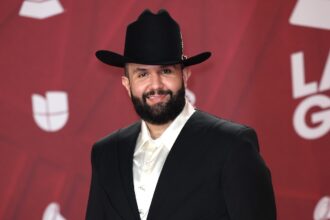Rosalía’s fans are living days of great expectation. After three years without releasing a studio album, the Catalan singer has officially returned to the music scene with a project that promises to mark a new chapter in her career. Her latest single, titled “Berghain,” is a collaboration with iconic Icelandic artist Björk and experimental DJ and producer Yves Tumor, a union that has generated excitement and curiosity in the industry.
The song works as a preview of her next album, LUX, which will be released on November 7, and with which Rosalía seeks to explore a more introspective and spiritual facet of her art.
“Berghain” represents a clear evolution in Rosalía’s career. In this track, the artist combines elements of orchestral, electronic and avant-garde music, mixing three languages -Spanish, English and German-, something uncommon even in her eclectic discography.
The title of the single refers to the legendary Berlin club Berghain, known worldwide as the epicenter of techno music and a symbol of artistic freedom. However, far from being a literal homage to that space, the song uses the name as a metaphor for inner transformation and emotional journey.
In the first verses, Rosalía sings in German, marking a contrast with the warmth of her voice in Spanish. The piece evolves into a complex orchestral composition that, according to specialized critics, reflects an emotional state between recollection and catharsis.
Björk’s participation in “Berghain” has been one of the most celebrated aspects of the release. The Icelandic artist brings a poetic and almost mystical dimension to the track, with verses that evoke a quest for collective redemption: “The only way to save ourselves is through the divine.”
His intervention gives the song a spiritual and philosophical tone, in tune with the general concept of the LUX album.
For his part, producer Yves Tumor, known for fusing genres such as noise, soul and experimental electronica, provides the enveloping atmosphere that defines the sound base of the piece. His participation reinforces the avant-garde character of the project, positioning Rosalía within a global musical dialogue that transcends the limits of traditional pop.
Rosalia: An exploration of faith, grief and transformation.

“Berghain” stands out not only for its musical richness, but also for its lyrical depth. The song addresses the grieving process and spiritual rebirth of a woman who tries to heal through introspection and connection with the transcendental.
Verses like “Solo soy ternura para un café” or “Sé desaparecer” reveal a vulnerability that connects with the emotional stage that Rosalía has explored in recent years, marked by personal growth and the search for meaning beyond fame.
According to Rolling Stone magazine, the single is part of the second conceptual block of the album LUX, a production that will include around 18 original tracks, divided into different thematic sections. This format suggests that the project will function as a conceptual work that combines mysticism, visual art and sound experimentation.
The promotional artwork for LUX has also generated conversation. On the cover, Rosalía appears characterized as a nun, which reinforces the spiritual tone of the project. This image symbolizes purity, sacrifice and the search for redemption, recurring themes in both her music and her visual narrative.
Experts point out that the album could represent an artistic transition, where the singer leaves behind the urban and experimental aesthetics of Motomami (2022) to enter a more conceptual, introspective stage, without genre boundaries.
With “Berghain”, Rosalía not only announces her comeback, but also reaffirms her position as one of the most innovative artists of her generation. Her ability to unite opposing worlds – electronic music and orchestra, the earthly and the spiritual, the intimate and the global – demonstrates her continued interest in breaking the mold.
As the release of LUX approaches, audiences and critics alike are waiting to discover just how far Rosalía will take this new artistic exploration that promises to redefine, once again, the boundaries of contemporary pop.
Here you can see Rosalía’s new video.
Find out more at ‘QueOnnda.com’.






















